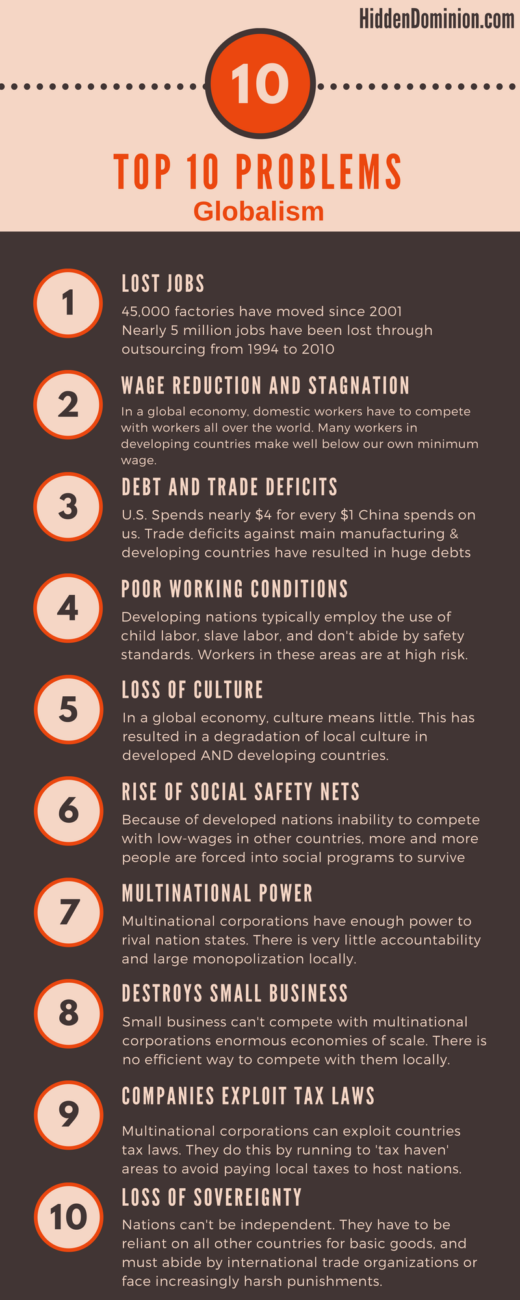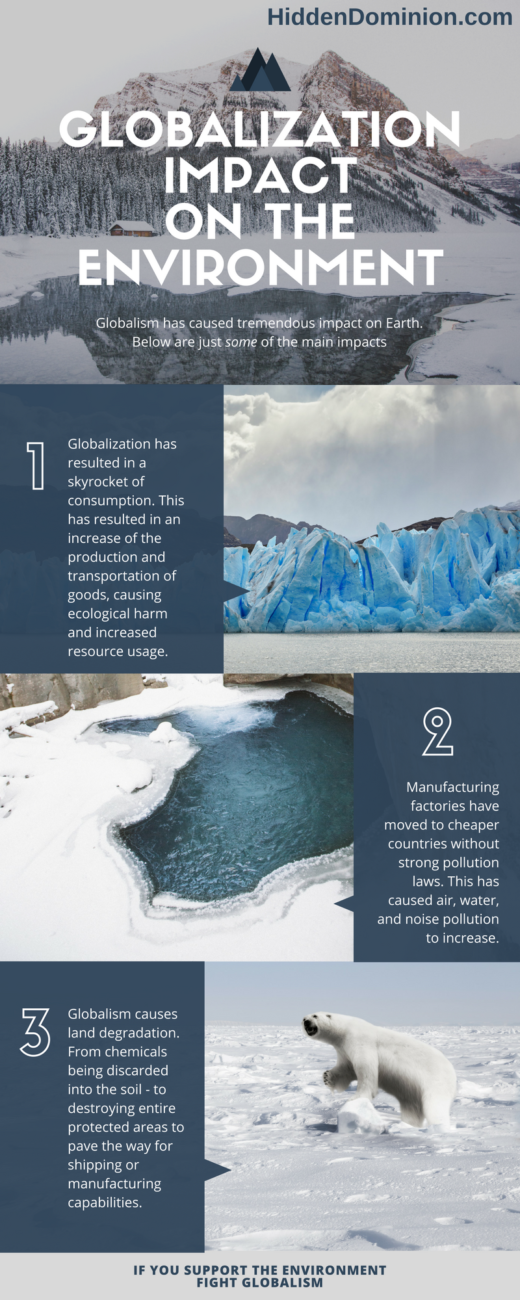Most Recent News


Popular News




We've compiled 16 strong arguments against globalism. Nationalists must both resist globalization and reveal the truth about it.
Let’s review some arguments against globalism.
Globalism has been in the making for many decades. Depending on your definition of “globalism”, you could even say it started as early as the late 1400s. However, in modern usage, it typically refers to the following: “Globalism: The attitude or policy of placing the interests of the entire world above those of individual nations”.
This is largely in contrast to internationalism, or “The principle of cooperation among nations, for the promotion of their common good”.
They sound very similar, but are in practice opposing.
Globalism promotes placing individual nations on the sideline, if it betters the entire planet as a whole. Whereas internationalism would never put any country on the burner. Internationalism focuses on cooperation between nations, AND having all of those countries reach a better state.
Globalization, on the other hand, does not care about individual states. Only the world as a whole.
Globalism seems like an honorable path. We all help each other. Everyone holds hands and sings hippy songs. When you first hear of it, there doesn’t appear much to be resistant too. However, when you look at the negatives, it causes for individual nation states, you will start to reconsider. Globalism isn’t about helping everyone. It’s about helping multinational corporations and hurting both developed and developing countries.
So let’s get into it. What are the top arguments against Globalism and Globalization?
If you’re not much into reading articles, check out the infographic below.
Please feel free to share this anywhere you find appropriate. Infographics are a pain to make, so all I ask is if you liked the material to please consider linking back to us.

Robert Scott of the Economic Policy Institute stated that “3.2 million jobs, including 2.4 million manufacturing jobs, have been drained by China alone”. Also included are Japan taking nearly 900,000 jobs, and Mexico also taking 682,900 jobs. Included in this list are 45,000 factories which have closed or moved offshore.
This is principally because of the trade deficit. Certain countries do not have as expensive of a wage/salary as the U.S. We are highly trained individuals with minimum wage requirements. Good luck trying to compete with the likes of China or India when they can give salaries of pennies on the dollar.
It’s simply economically cheaper for major corporations to ship things offshore. That way, they don’t have to pay benefits or high salaries. Since it’s legal and they face no harsh taxes, it is simply the best economic choice.
But this destroys our own at-home industries and job capabilities. There used to be a time in America where workers actually had a bargaining chip, because there were more jobs than workers available. In today’s economy, that is simply not the case. Most jobs are low earning ones, where people can’t survive on that income very easily.
Workers in developed countries face strong wage cuts or wage stagnation because of globalism. Globalism has caused companies to not be able to compete as effectively, since they are on a worldwide scale.
Local companies can’t offer higher salaries, because their products or services would become much more expensive compared to multinational corporations. When large corporations use economies of scale, and low wage labor and taxation in other countries, smaller businesses can’t raise wages. If they do, they’ll go out of business by not being able to compete with the multinational corporations’ prices.
We also can’t disregard the fact of wages in the “new” manufacturing countries. Places like China, India, and Mexico. These places pay their employees pennies on the dollar. It’s hard for them to survive on it. Many work well over the regular 40-50-hour workweek the average American has.
Speaking of developing nation workers, they also have to deal with terrible conditions. Child labor is commonplace for families to survive. Slave-like labor is still employed in many developing countries (Apple’s “suicide net” off their buildings).
Not to forget that modern safety standards and regulations aren’t typically in law or even enforced in these countries. Workers are in terribly harsh conditions and don’t have the proper equipment or expertise to deal with their work areas. And it’s not like the multinational corporations care about them at all.
These large multi-national corporations don’t pay adequate taxes. You have probably seen this in the news, where certain companies are given tax breaks.
It’s pretty simple for companies that span many countries to skirt taxes by going to tax havens and following their lax regulations and laws.
So not only do they reduce jobs, wages, and affect developing countries workers, they also avoid their responsibility of helping better their original nation state.
U.S. Spends $4 for every $1 China gives us. Many of our trade partners are similar. We are going into enormous debt to pay for these companies and their products, hurting every Western taxpayer through debt.
We are passing on a huge burden of debt and trade deficits to our children. They will be the ones to inherent this reckless disregard for basic economic principles.
Into the hands of multinational corporations and organizations. Things like the World Trade Organization, the European Union, and trade agreement enforcement.
These companies have jurisdiction to sue in countries that they aren’t even from. They are enforceable by these international organizations which seek to limit the power of nation states.
This centralization of power in the hands of un-elected officials is frightening. How are we supposed to control them if they go rogue? We can’t vote them out. They are immune.
This is a dangerous precedent to set, and completely contrary to Western values.
Small business can’t compete with these powerhouses.
Their massive economies of scale, tax-evasion, and ability to offshore for low wages and regulations make them impossible to compete with. Local businesses have no chance.
This further takes away the “unsung” jobs. Jobs which were never created because everyone knows they can’t even try to compete with the big dogs. So no one attempts to make a business similar to theirs.
It doesn’t help that these companies can buy out smaller companies as well. Should any smaller company start to gain traction, they can simply offer them a small bounty of some millions to get them in check. Then, another domino falls into the hands of the multinational corporations.
To produce the services and products that major companies need, they have to have people to develop and implement them. Typically, the manufacturing part is done in developing nations. It’s very easy for them to take this technology and rip-off the company and make a cheaper alternative. This results in the cheaper alternative being cheaper and more prominent.
Since it is purchased more often, the host industry (the stealer’s country) will raise their GDP from this product.
It hurts our people because if our technology was innovative and popular, we won’t get the full benefit from it. There’s no way to enforce that they obey this without further power being given to multinational organizations like the WTO. So it turns into a lose-lose situation. We get screwed over either way.
People lose their jobs from globalism. They can’t get wage increases or betterment from salary stagnation. So what do they do?
They go on welfare programs.
It should be no question the resulting problem of an increase in welfare consumption, but to give a short idea: It increases taxpayer burden, increases dependency on the state, and reduces the number of taxpaying individuals.
This only furthers the problem of job loss and wage stagnations, because now even more people have to pay extra in taxes to support those who can’t get a job because their industry has been outsourced.
We are reliant on many countries now for manufacturing and service industries.
We are deindustrializing.
What happens if a major world conflict were to occur? The lines would be drawn, and we are out of a hell of a lot of manufacturing power. Sadly, we’d need years to build back up to a point where we would be able to adequately compete again.
We lose our ability to adequately handle national security. If we don’t have the ability to build everything we need in the case of a world-wide crisis, we aren’t secure as a nation.
It’s never good to be overly reliant on anything. Whether you’re a person or a nation. By giving up our abilities to cheaper alternatives, we are neutering ourselves.
We aren’t a sovereign nation if we have to abide by international organizations that control us. Globalism supports these integrations with places like the United Nations and the World Trade Organization. Being forced to follow un-elected officials is not independence.
As mentioned above, how would we fight against these people? They aren’t elected. We can’t vote them out. We can’t bring in politicians who will fight them because they are typically in their pockets. There’s no way out of this vicious cycle besides never getting in it, or slowly rolling back the agreements. Even Brexit will takes months or years to complete, because of how complicated these international organizations make the process of withdrawal.
Not to mention that one large financial hit in one country would drag us all down. Since we are so intertwined economically, anyone that falls off the ship will take us with them.
We must always remember that we are free countries. It is not our responsibility to bend over to every international organization that wants to use us to line their coffers.
Environmental problems with globalization include:

This problem with globalism occurs because of increased contact through trade routes and interdependency.
Many diseases in the past were confined to relatively geographic-specific areas. If a black plague were to arise today, it could infect at least one person in the entire mainland world within one week.
Pandemics are becoming an increasingly large threat because of antibiotic-resistant strains popping up. All it would take is one that was lethal that laid dormant for over a week to truly wreak havoc on this entire world because of our globalist tendencies.
Local cultures in developing nations are becoming ‘capitalistic’ whether they like it or not, through globalization. This can spark a large-scale uprising against Western nations because of our perceived interference with their culture and traditions.
It also harms our own local cultures as well. We are no longer seen as independent cultures within nation states, but as an increasingly forced-unified “global culture”.
But the different cultures and traditions of nations are what make us so unique. It’s what makes the world a great place to live. If we are all the same, where is the ‘diversity’ the globalists so often admire?
Local cultures also lose their language, or the specific understanding of it. Increasingly, people in the West must be politically correct because of ‘cultural diversity’, while developing nations lose their language in favor of the dominant business language.
In short, globalism rids the world of human diversity and identity. We are becoming a glob on the world, instead of having our own cultural, national, and personal identity.
We buy products from China or India. And then our own countries go and build companies and factories in these countries.
We’re investing in their products and investing in their industries/infrastructure. We are giving up our own industries to invest in theirs.
How is this a positive thing to the people I will never understand. We are purposely leaving our industries and jobs behind just to help theirs. The only “benefit” we get is cheaper products.
But are they actually cheaper?
No. Because the job loss, increased taxation through social welfare programs, and wage stagnation reduce our purchasing potential to begin with. If you made more money, you could afford more expensive items. Now the items are cheaper, but you don’t make as much money. It’s a trick, and not economically sound. It looks good on paper, because of course developing nations’ products are cheaper. But what they don’t take into account is the cost of allowing this.
Globalism increases corruption.
It increases corruption on the international and national level.
The primary beneficiaries of globalism and globalization are:
This is because multinational corporations receive the huge tax breaks and economies of scale to totally dominate the world market.
The wall street investors use financial speculation and international trade agreements to make millions while others barely survive.
And politicians get the bribes and campaign support by multinational corporations by promising they will further their agenda or support their international business practices.
Notice anyone missing? Oh yeah, what about the average American? The worker in China? The small business owner? They don’t see any benefit from globalism or globalization.
But of course they don’t, because globalism was never meant for them. It was meant to create a global economy that the powerful can control.
Local national leaders/politicians will ignore environmental concerns in the interest of big business. Corruption runs rampant among financial executives who attempt to hide or conceal taxes and other multinational “tricks”.
It’s rotten to the core. We can’t control these people either, because they aren’t elected or reside in different countries. So we have to support, or at least ignore, the rampant corruption that globalism causes.
 People state that globalism benefits the richest countries. Find any leftist website or other economics-illiterate person and they will say the same.
People state that globalism benefits the richest countries. Find any leftist website or other economics-illiterate person and they will say the same.
But it doesn’t. It doesn’t benefit any nation.
It works in the interest of multinational corporations, financial executives, and politicians. Everyone else is tossed to the back burner.
The developing countries suffer poor working conditions, unlivable wages, terrible environmental harm, and loss of control.
Developed nations suffer from loss of jobs, fake “cheaper” products, wage stagnation, rise of welfare, loss of national identity, small businesses destroyed, stolen technology, and a plethora of other issues.
All nations suffer from a loss of culture, loss of sovereignty, and rise of corruption.
The problems with globalism are numerous. Join us in the fight against this corrupting influence. Say no to “the false song of globalism”.
Comments are closed.
(Learn More About The Dominion Newsletter Here)
Globalism is a threat to all of us including the poor nations. Americanization is happening everywhere and it won’t end well
It isn’t all americans fault, a lot of us hate globalization as much as the rest of the world. The powerful corporations and lobbyists have a stranglehood on our politicians
Definitely. Americanization is a problematic symptom, but it’s their own countries adopting it. We can’t fix every culture, just our own.
#17: will destroy us all and lead to World War 3 where banking elites will make off with tons of money while millions of us “lowers’ will die.
Let’s hope it doesn’t come to that. Fight now, to preserver later
What are your sources for this? I’m doing this topic for debate and I kinda need them. Great article btw
Great article. I am a believer in movements like localism , and ubuntu , but we are totally screwed it seems, by globalism, neoliberalism and our fraudulent banking system. Our politicians have betrayed us long ago. I’ll support anyone who has answers
Thank you for the kind words.
I totally agree with your observations, am searching for a cohesive group to follow, literature to read.
If you’re interested in books, give me a shout out.
One of the greatest problems with globalism which you didn’t mention is their (the globalist elite) infatuation with population control and mass spreading of abortion and sterilization.